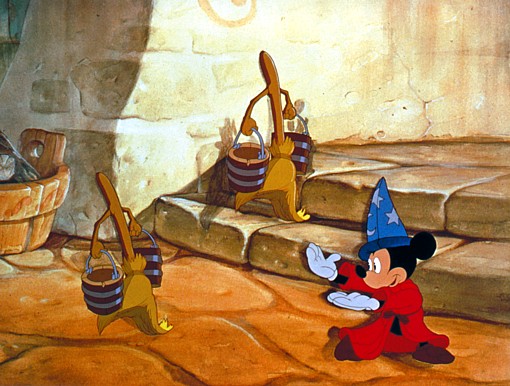We are all sorcerer’s apprentices

Walt Disney’s Fantasia (1940)
I discovered Nick Carr’s intelligent and lucid critical analyses of the impacts of ever-increasing omnipresence of digital technology years ago, in 2005. Ever since, I have found that his views aren’t that far from mine on the subject. Needless to say, they aren’t rooted in rueful longings for a paradise lost, nor are we neo-Luddites or, worse, Unabombers.
Take for example his 2008 Atlantic Monthly paper, Is Google Making Us Stupid? What the Internet is doing to our brains: decrease in capacity for concentration [on a single task] and contemplation, trouble reading in-depth long articles or books (if you can read his whole paper uninterruptedly and in one sitting, you haven’t been yet that much affected), change in the style of writing (Twitter is to writing what surfing is to reading), increased reliance or dependence on search engines (or is it on a search engine). He justly quotes Richard Foreman who writes: “I see within us all (myself included) the replacement of complex inner density with a new kind of self—evolving under the pressure of information overload and the technology of the ‘instantly available’.”
In a paper published yesterday in the Atlantic Monthly, “All Can Be Lost: The Risk of Putting Our Knowledge in the Hands of Machines”, he describes how we react to computer failure, e.g., pilots in airplanes: not only those systems are so complex that it is sometimes difficult to gauge what happens when they start failing, but overreliance on them has made us less able than in the past to take over when they do so (can you still mentally figure out how much you’ll pay when you exit a supermarket?). In his words, “Overuse of automation erodes pilots’ expertise and dulls their reflexes, leading to what Jan Noyes, an ergonomics expert at Britain’s University of Bristol, terms ‘a de-skilling of the crew’”.
This isn’t new. Without going back to Plato who bemoaned the negative influence that the invention of writing would have on human memory which Carr quotes it in his 2005 article, this increased dependence and its long-term mental and physical debilitating effects are reminiscent of H.G. Wells’ description of the humans of the future, in his 1895 novel The Time Machine: “The Eloi, like the Carolingian kings, had decayed to a mere beautiful futility.”
Except that our future is likely not to be beautiful. Yes, it is true that while we loose (some?) skills we gain a lot: but as we go higher and faster and live longer, we are also much more tracked and controlled than before by a myriad of the eyes and ears of ever-increasing world-wide complex and interlocked systems in which local failures may cause global harmful repercussions much farther and faster than ever before. And now that we know that the Earth resources aren’t infinite and that a much larger system is breaking down due to our combined negligent and sometime willful actions and inactions, and without not only our technical but also political will and ability to fix or to stop its disruption, we may be less apt to face the unexpected.
Is the future still in our hands? Definitely so, but probably not the way we hoped it would be.
